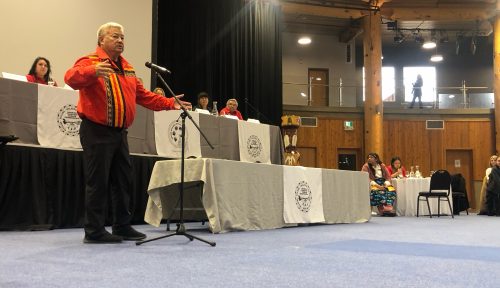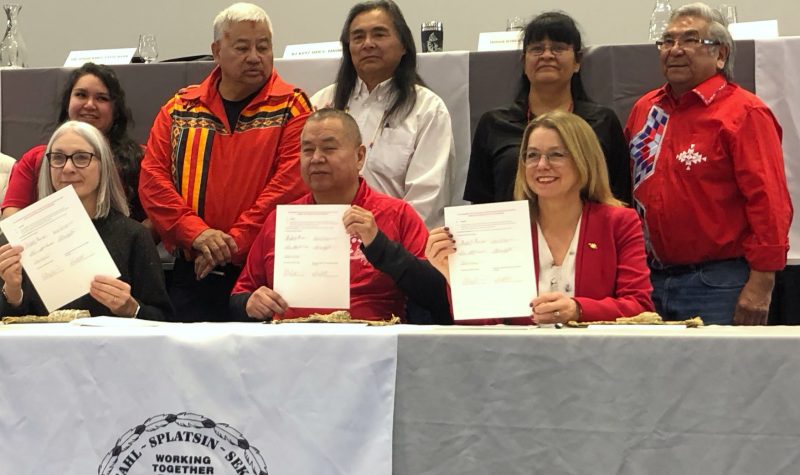The Splatsin Band, based in Enderby, is the first in B.C. to sign a coordination agreement with the province and country to implement the federal Bill C-92, an Act respecting First Nations, Inuit, Métis children, youth and families.
The agreement applies to Splatsin and all communities within Secwépemc. It's a $136.3 million, 10-year agreement that will help Splatsin families stay together, and keep Splatsin children in their communities instead of going into the provincial foster systems. It's the fifth agreement to be signed nationally since the act came into affect in 2020.
The signing ceremony was held at the Splatsin Centre in Enderby. It's a round, wooden building and it smelled like burning sage inside on March 24, the day of the ceremony. MC Gloria Morgan said, "it's not often we get ministers in Enderby, referring to federal Indigenous Services Minister Patty Hadju and provincial Minister of Children and Families Mitzi Dean."
Morgan was removed from her home as a child and lived in care of the state.
“The horrors of living in those foster homes wasn’t necessarily mistreatment," she told the crowd. "I was a half hour away from where my dad lived and for four years I didn’t see my dad.”
Listen to a full interview with Kukpi7 Doug Thomas:
Morgan introduced each band council member and they spoke about the significance of this agreement, and the work that lead up to it. Coun. Theresa Williams said that three band members recently died. The nation is supposed to stop and not doing anything in times of grief, and Williams thanked the families for allowing the signing and ceremony to go ahead.
Wayne Christian became the chief of Splatsin in 1980, when it was called the Spallumcheen Indian Band, when he was 25 years old. Christian spoke to the crowd before the agreement was signed.

Wayne Christian speaks before the agreement is signed. Photo by Meagan Deuling.
He said he and his 10 siblings were taken out of their homes during the Sixties Scoop. This is when waves of First Nation children across the country were taken out of the homes and communities and placed in non-Indigenous households and communities.
Over 100 children were removed from the Spallumcheen Band during the Sixties Scoop, Christian said.
Listen to a full interview with Wayne Christian:
At the time, Christian helped write Bylaw no. 3, A bylaw for the care of our children, which recognizes the band's authority over all Spallumcheen children, whether they lived on or off the reserve. He asked those in the crowd who went with him in 1980 to Vancouver to march in what was called the Indian Child Caravan to stand up, and about 10 people did. The Splatsin and supporters marched to then-deputy premier Grace McCarthy's house, and they demanded jurisdiction over their children. The province and Canada recognized the bylaw.
Splatsin Stsmamlt Services, formally called the Spallumcheen Child Welfare Program, was created through the law, and the money from the agreement signed today will go into that program. Coun. Leonard Edwards told the crowd that "We live in poverty in this country of Canada."
"Through this agreement, time, resources and energy can be used for healing, wellness and growth within our community," Christian said, "and less time on Western law."
A press release from the B.C. government says, "This coordination agreement addresses the coordination of services, the delivery of emergency services, mechanisms for First Nations children to exercise their rights, and fiscal agreements that are needs-based, sustainable and consistent with the principle of substantive equality. The coordination agreement also establishes funding from the federal and provincial governments to ensure that the necessary financial resources are in place."
In the fall, B.C. announced it was updating provincial legislation that governs child welfare to give First Nations community more jurisdiction over children and families. Provincial and federal changes to child welfare act are to align legislation more closely with the United Nations Declaration on the Rights on Indigenous Peoples (UNDRIP), which both B.C. and Canada have legislation to implement.
Bringing legislation in alignment with UNDRIP to allow First Nations jurisdiction over their children is also part of the 94 Calls to Action from Canada's Truth and Reconciliation Commission report.
Hadju said in an interview after the agreement was signed that "This ten year agreement allows the community now to have the confidence financially that they can plan for the long term."
Another strength is that through coordinating, the province, country and First Nation can work together to find children who are in care of the state, and help them return to their community, "in a much more cohesive, less combative way." Hadju said.
Listen to a full interview with Patty Hadju and Mitzi Dean:
In an interview, Wayne Christian said that this agreement is like opening the door and letting the light shine in.
"And as we open that door we're going to kick it open for other communities to follow behind us," he said.
Christian's son was in the crowd, as was his 20-year old granddaughter Illyna Christian, who said she was there with a heavy and a light heart.
Listen to a full interview with Illyana Christian:
"But I'm glad we're all here on a positive note, because we really lack that in our community right now," she said.
Christian said she works in the youth department in Splatsin and she's been noticing many children returning home. She said it's hard because it happens bit by bit, and not all at once.
"Good things are coming," she said. "All we desire is getting our children back home. And that's it."
Click below to listen to a radio story:


